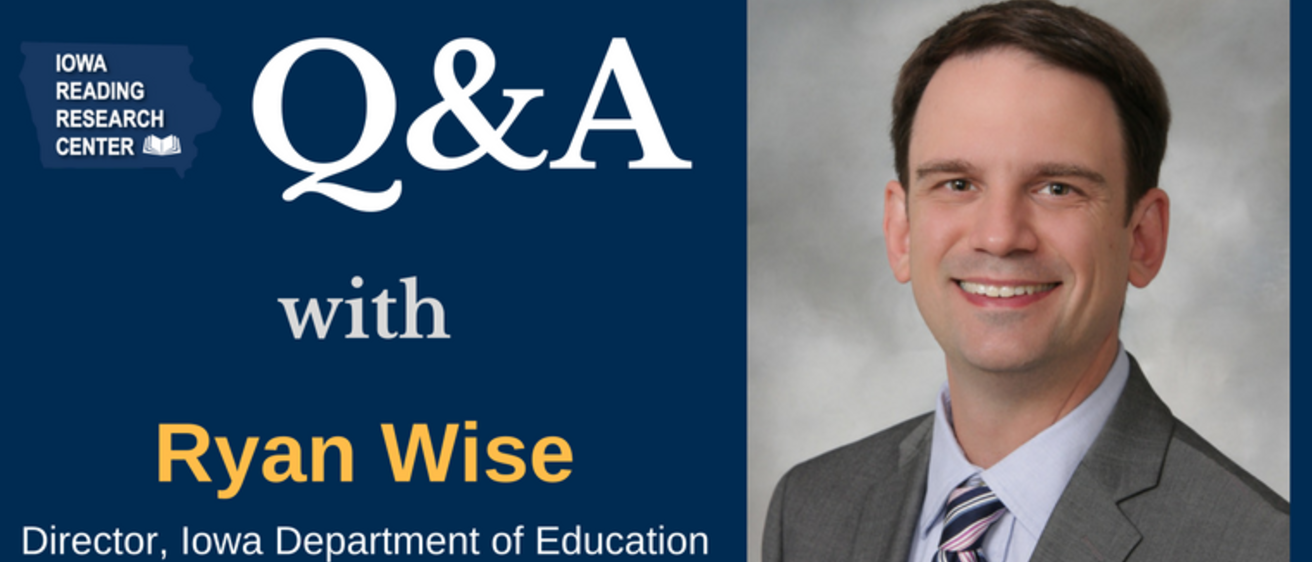889 | 4 minute read
Iowa Department of Education Director Ryan Wise spent the first five years of his career as a history teacher in Tunica, Miss. (two years), and Omaha (three years), until he began taking on administrative leadership roles in 2003 at organizations like Teach for America and Teach for All. He joined the Department of Education in 2012, and was hired to be its director in the summer of 2015.
Far from being holed up behind his desk, Wise’s experiences in the classroom continue first hand. In fact, we caught up with Wise for this Q&A as he was in transit between school visits. As Wise once relayed on his Twitter account, one of his two sons once described Wise’s job by saying “he visits classrooms and does stuff.” Wise’s experience not only as an educator but also as a father plays a big role in his commitment to and understanding of literacy education issues in Iowa.
Q: What in your past experience has sparked your passion for improving literacy for all students?
Ryan Wise (RW): My experience as a parent drives my commitment to ensuring all kids have strong literacy skills. As the father of a second-grader and a fifth-grader in a diverse public school, I know my sons and their classmates bring a range of interests and skills to school each day.
Some students possess a love of reading, which is often nurtured at home. For them, reading seems to come as easy as breathing. Others are more reluctant readers and may have challenges requiring more time and targeted interventions to develop the skills they need to be strong readers. I see this range in my home and in my kids’ classrooms. All students deserve the individual support they need to read well.
My passion is also fueled by the efforts I see teachers making in classrooms across Iowa to improve literacy for all students. I’m inspired by the unwavering commitment of teachers and administrators to improve instruction to meet the needs of their students.
Q: How would you describe the three leadership skills you have seen demonstrated across school systems that are successfully improving the literacy outcomes of their students?
RW: School systems improving the literacy outcomes of their students share a few key leadership approaches. First, they effectively use data to meet the needs of all students. These schools use data to monitor student progress and adjust instruction. Leaders in these schools can describe the progress happening both at the school and by grade level, and teachers can tell you what improvement looks like for both the class as a whole and individual students.
Second, they leverage existing resources. Successful school systems see themselves as exactly that – a system. They don’t let teachers function in isolation; they utilize teacher leaders and administrators within their school and take advantage of resources outside of their school, such as support provided by Area Education Agencies and tools shared by the Iowa Reading Research Center.
Finally, they adjust over time. Successful systems pinpoint barriers to improvement and develop effective approaches to address those issues. They are relentless in strengthening the instruction all students receive while also refining the interventions individual students need when they are struggling.
Q: Through your leadership of the Iowa Department of Education, what initiatives do you hope to implement or continue supporting to improve the literacy abilities of Iowa’s students?
RW: The Iowa Department of Education is focused on several key initiatives to strengthen literacy. First, the Department will continue to support schools in the effective implementation of Iowa’s early literacy legislation, which was initially passed in 2012. This includes improving our statewide data system and ultimately developing a standard of care in literacy that ensures all schools have the knowledge base and resources they need to meet their students’ specific needs.
Second, the Department remains focused on strengthening Iowa’s Teacher Leadership and Compensation (TLC) system. This year, roughly one-quarter of all teachers in Iowa hold a formal leadership role. Many of these teacher leaders are designated as literacy coaches or model teachers with an emphasis on effective reading instruction. Iowa has many highly skilled literacy experts in classrooms across the state and TLC presents us with the opportunity to leverage their expertise to improve the literacy skills of more students.
Finally, the Department will help schools implement high-quality and aligned standards and assessments. We just completed a statewide review of Iowa’s literacy standards and we are in the early stages of transitioning to new assessments. Our goal is to help schools understand the changes ahead and to access resources that will ensure smooth and effective implementation.
Q: What changes do you foresee over the next 10 years that will influence literacy instruction or the expectations for students’ literacy performance?
RW: Over the next decade, expectations for students’ literacy performance will continue to grow. Governor Terry Branstad and Lieutenant Governor Kim Reynolds, through the Future Ready Iowa initiative, have set an ambitious goal: 70 percent of Iowans in the workforce will have education or training beyond high school by 2025. Helping all Iowa students develop strong literacy skills is foundational to achieving this target. When our youngest learners receive the specific support they need to read successfully, their trajectory toward postsecondary success improves.
Thank you Director Wise for providing your insight into literacy education in Iowa!
